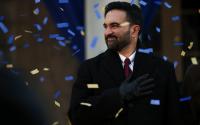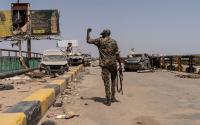13 April 2006Vikram Dodd and Carlene Bailey
A high court judge branded the government's system of control orders against terrorism suspects "an affront to justice" yesterday and ruled that they breached human rights laws.
The ruling by Mr Justice Sullivan came after a challenge to the first control order issued against a British Muslim man, alleged by the security services and the home secretary to have been planning to travel to Iraq to fight UK and US forces.
At least 11 control orders have been issued, allowing the government to restrict the liberty and movement of people it claims endanger public safety because of their involvement in terrorism but who can not be tried in the courts.
The judge said the anti-terrorism measures were "conspicuously unfair" and dismissed supposed safeguards of suspects' rights as a "thin veneer of legality". He had to say "loud and clear" that the laws were unfair otherwise "the court would be failing in its duty."
But he said the laws passed had been drafted in a way that prevented the courts overturning control orders.
In this case, the judge said, Charles Clarke had made his decision to issue the order based on "one-sided information", but he was "unable to envisage the circumstances" allowing the court to quash the home secretary's decision. As a result, the judge said, he would have to leave the order in place, even though he ruled that it contravened human rights law.
The ruling gives hope to two Muslim men who will go to the high court next month to challenge control orders they are subject to. They are relying on broadly similar arguments to the ones Mr Justice Sullivan found so convincing.
The judgment led government critics to point out that twice in two years the courts have found that anti-terrorism laws breached human rights. It also came on the eve of new laws coming into effect designed to tackle the threat of Islamist violence.
The Home Office rejected the court's ruling and vowed to appeal. "The ruling will not limit the operation of the act," the Home Office said in a statement. "We will not be revoking either the control order which was the subject of this review, nor any of the other control orders currently in force on the back of this judgement.
"Nor will the judgment prevent the secretary of state from making control orders on suspected terrorists where he considers it necessary to do so in the interests of national security in future."
The independent reviewer of the government's anti-terrorism laws, Lord Carlile, said if the appeal was not successful ministers would have to consider amending the law.
He told the BBC: "I hope we will not get another piece of rushed legislation. I think this really does need mature reflection."
Muddassar Arani, solicitor for the Briton, who is of Arab heritage, said: "This was the first British Muslim subject to a control order and he's being treated as a second-class citizen.
"It is clear the home secretary is acting as the judge, jury and prosecutor."
The man, a student originally from South Yorkshire, was stopped by counter-terrorism officials on March 1 2005 trying fly to the Middle East from Manchester airport, and then again the next day at Heathrow. He says he was travelling to Syria for a holiday, but security services say he was planning to fight in Iraq.
In September 2005 Charles Clarke signed a control order against him, revoking his passport, banning him from buying plane tickets, and banning him from airports and train terminals from where he could travel abroad.
The judge said the system was unfair because the man could not know the evidence, which was so sensitive it had to be kept secret from the accused.
A special advocate could not properly represent him, because the secret evidence could not be discussed with the client. The judge said: "If, as in this case, the substantial part of the case against him is not disclosed to the individual in question, it is difficult to see how the very essence of the right [of access to the court] is not impaired."
Mr Justice Sullivan said the court cannot review whether the facts exist to support the home secretary's suspicions and therefore "the overall procedure is manifestly ineffective and unfair".
This meant the Briton's right to access to a court, guaranteed by the European convention on human rights, was denied and the judge ruled the control order system was "incompatible" with human rights law.
Mr Justice Sullivan concluded: "Controlees' rights ... are being determined not by an independent court ... but by executive decision making untrammelled by any prospect of effective judicial supervision." Closing the case and addressing lawyers for the Muslim man, Mr Justice Sullivan made clear his frustration at the control order system: "If you erect a structure where people in the position of your client, to be frank, don't have a chance, the secretary of state is always going to win."
The system of control orders replaced the "Belmarsh system", whereby foreign nationals suspected of terrorist involvement could be detained without charge or trial.
Lawyers for the Briton say counter-terrorism officials racially abused him after he was first stopped travelling.
The government was granted leave to appeal, but last night they faced a torrent of criticism from Conservatives, Liberal Democrats and civil liberties campaigners.
Shami Chakrabarti, director of Liberty, said: "Fundamental human rights, such as the right to a fair trial, are what distinguish democrats from terrorists and dictators. The government's policy is in tatters - we hope that this time they are listening."
The judiciary dealt a second blow to Mr Clarke yesterday by finding he was wrong to try to refuse a British passport to an Australian national held in Guantánamo Bay by the US. David Hicks qualifies for a British passport, but the court of appeal rejected a challenge by the home secretary to an earlier court decision that he must grant citizenship.






